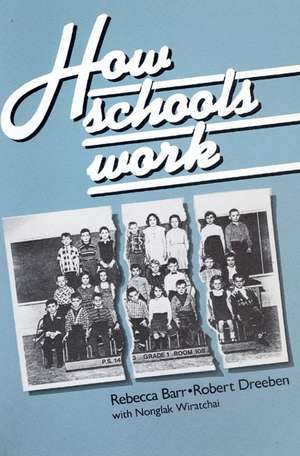How Schools Work
Autor Rebecca Barr, Robert Dreebenen Limba Engleză Paperback – 31 mai 1988
As budgets tighten for school districts, a sound understanding of just how teaching and administration translate into student learning becomes increasingly important. Rebecca Barr, a researcher of classroom instruction and reading skill development, and Robert Dreeben, a sociologist of education who analyzes the structure of organizations, combine their expertise to explore the social organization of schools and classrooms, the division of labor, and the allocation of key resources.
Viewing schools as part of a social organization with a hierarchy of levels—district, school, classroom, instructional group, and students—avoids the common pitfalls of lumping together any and all possible influences on student learning without regard to the actual processes of the classroom. Barr and Dreeben systematically explain how instructional groups originate, form, and change over time. Focusing on first grade reading instruction, their study shows that individual reading aptitude actually has little direct relation to group reading achievement and virtually none to the coverage of reading materials once the mean aptitude of groups is taken into consideration. Individual aptitude, they argue, is rather the basis on which teachers form reading groups that are given different instructional treatment. It is these differences in group treatment, they contend, that explain substantial differences in learning curricular material.
Viewing schools as part of a social organization with a hierarchy of levels—district, school, classroom, instructional group, and students—avoids the common pitfalls of lumping together any and all possible influences on student learning without regard to the actual processes of the classroom. Barr and Dreeben systematically explain how instructional groups originate, form, and change over time. Focusing on first grade reading instruction, their study shows that individual reading aptitude actually has little direct relation to group reading achievement and virtually none to the coverage of reading materials once the mean aptitude of groups is taken into consideration. Individual aptitude, they argue, is rather the basis on which teachers form reading groups that are given different instructional treatment. It is these differences in group treatment, they contend, that explain substantial differences in learning curricular material.
Preț: 284.56 lei
Nou
Puncte Express: 427
Preț estimativ în valută:
54.46€ • 56.42$ • 45.45£
54.46€ • 56.42$ • 45.45£
Carte tipărită la comandă
Livrare economică 21 martie-04 aprilie
Preluare comenzi: 021 569.72.76
Specificații
ISBN-13: 9780226038124
ISBN-10: 0226038122
Pagini: 206
Dimensiuni: 152 x 229 x 15 mm
Greutate: 0.27 kg
Ediția:1
Editura: University of Chicago Press
Colecția University of Chicago Press
ISBN-10: 0226038122
Pagini: 206
Dimensiuni: 152 x 229 x 15 mm
Greutate: 0.27 kg
Ediția:1
Editura: University of Chicago Press
Colecția University of Chicago Press
Notă biografică
Rebecca Barr is professor of education at the National College of Education. Robert Dreeben is professor of education at the University of Chicago. Nonglak Wiratchai is assistant dean of the Graduate School and lecturer at Srinakharinwirot University, Bangkok.
Cuprins
Preface
1. Introduction
2. Considering and Reconsidering Educational Effects
3. Levels of School Organization
4. Social Organization of Classroom Instruction
5. Group Properties and Content Coverage
6. Individual Learning
7. Conclusion
Appendixes
References
Index
1. Introduction
2. Considering and Reconsidering Educational Effects
3. Levels of School Organization
4. Social Organization of Classroom Instruction
5. Group Properties and Content Coverage
6. Individual Learning
7. Conclusion
Appendixes
References
Index
